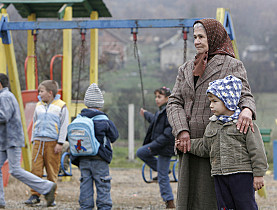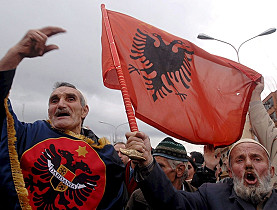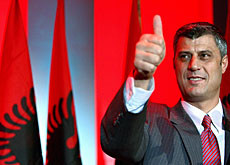OSCE maintains delicate balance in Kosovo

The Swiss head of the OSCE mission in Kosovo has said Serbia would see a declaration of independence by the breakaway republic as "a violation of international law".
Tim Guldimann of the Organization for Security and Co-operation in Europe (OSCE) was commenting as Serbia increased diplomatic resistance to any change in the status quo.
Serbia’s Prime Minister Vojislav Kostunica warned the European Union on Tuesday that sending a supervisory mission to Kosovo could damage relations with Serbia.
The EU is preparing to deploy a 1,600-strong police and justice mission to the republic.
Serbian leaders also declared they would try to block Kosovo’s planned declaration of independence through the International Court of Justice. The international court is the United Nations highest court for resolving international disputes.
Guldimann told swissinfo it was evident that Kosovo would cooperate with the West on moves towards independence, rather than go it alone.
“We can assume that the approach will be a coordinated one between the authorities in Pristina and Western partners,” he said.
“However there is no international consent for this procedure in terms of a decision to be taken by the Security Council or a decision to be agreed upon with Russia,” he pointed out.
Large mission
With a staff of about 1,000, the OSCE’s Kosovo mission is the most comprehensive of all the organisation’s 19 missions. It is responsible for human rights and minority rights, the rule of law, the creation of democratic institutions, and the organisation of elections.
Tim Guldimann said the role of the Kosovo mission would be reassessed in the context of any declaration of independence.
The Swiss diplomat, who took over as head of the mission in October, added that he still hoped that all participating states would see the usefulness of a continued presence of the mission in Kosovo.
“The next step will be to achieve a decision in the permanent council of the OSCE to extend the mandate for next year… This decision will be reassessed in the light of the upcoming scenario of the declaration of independence,” he said.
Following the passing of the December 10 deadline without a deal between Kosovo Albanians and Serbia, Albanian leaders said they would start talks with the United States and European Union on declaring independence, probably in early 2008.
Serbia has rejected phased-in, supervised statehood for Kosovo, while Kosovo Albanians, who represent 90 per cent of the province’s 2 million people, want nothing but independence.
swissinfo
The Vienna-based OSCE is an international organisation that aims to prevent conflict and manage crises in Europe, the Caucasus and central Asia.
The 1,000-strong OSCE Mission in Kosovo was set up in 1999 and is integrated within the overall framework of the UN Interim Administration Mission in Kosovo.
The organisation’s mandate is broad. It aims to promote democracy and human rights and resolve regional conflicts. To this end it encourages political, social and media reforms.
Kosovo has been run by the United Nations, backed by Nato troops, since the alliance’s 1999 bombing campaign to end a Serb crackdown on ethnic Albanian separatists.
The 90 per cent Albanian majority reject return to Serb rule. Newly-elected leaders of the province have promised to coordinate a declaration of independence with the US and the EU, which is due to take over supervision of the territory from the United Nations.
In 2005 Switzerland became the first state worldwide to call for formal independence for Kosovo. The Swiss position is pro-consensus, arguing that evolution towards formal independence must happen under close international monitoring as well as through negotiations with the Serbian capital, Belgrade.

In compliance with the JTI standards
More: SWI swissinfo.ch certified by the Journalism Trust Initiative


You can find an overview of ongoing debates with our journalists here. Please join us!
If you want to start a conversation about a topic raised in this article or want to report factual errors, email us at english@swissinfo.ch.